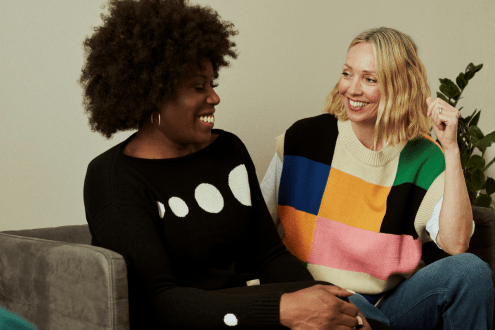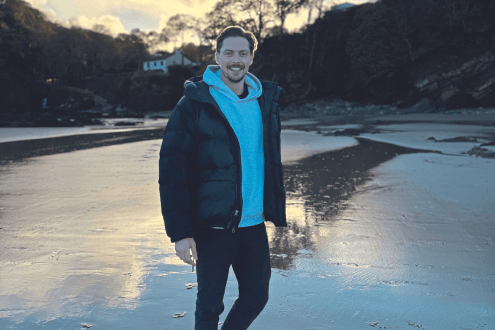Anxiety as a strength: positive affirmations for turning your fears into critical guidance
Dr Ellen Vora shares her positive affirmations for anxiety as a critical compass that helps us navigate life

Rather than something to be suppressed and ‘solved’, anxious feelings can be a critical indicator of powerful intuition, pushing you towards action and nudging your life back into balance. Dr Ellen Vora shares her positive affirmations for anxiety as a critical compass that helps us navigate life.
Even when we cut out the coffee and prioritize sleep, we will still be left with a certain amount of anxiety. This anxiety rises from the inherent fragility of life, but it also offers us the strength of our convictions. That is, when our lives don’t align with our values or capabilities, we can feel anxious—but this feeling can also serve as a critical indicator that we need a course correction.
Perhaps you are glossing over inequities in your partnership; maybe you are working in a job that fit your life when you were younger but now feels as if you took a wrong turn along the way, or you might feel unable to sit idly by as the planet continues to heat up and sea levels precipitously rise. Whatever the issue, this is your body’s way of telling you, Please look at this.
When you listen closely, this anxiety can point you in the direction of actions you need to take as well as the unique contribution you are here to make. Ultimately, this feeling of unease can transform into a feeling of purpose. This is what I call true anxiety.
I tell my patients that they should embrace these feelings rather than try to suppress or avoid them. Instead of asking, How can I stop feeling so anxious?, we should be asking, What is my anxiety telling me? It is natural to reflexively resist this uncomfortable feeling.
Culturally, we’ve also been taught to view anxiety as a nuisance, something to be suppressed into submission—but when we do this, we can miss out on critical guidance.
What if you could learn to tolerate your anxiety long enough to hear what change is necessary? What if you could change the situation provoking your anxiety? What if instead of fearing and fighting true anxiety, you invite it in and hear what it has to say? Maybe you’ve been blocking something painful from your awareness, or maybe you just haven’t slowed down enough to allow it to rise to the surface—but there is a part of you that has always known your essential truth.
The “essential truth” of who we are has, as of late, become a bit of a cliché, spouted so often it can sound hollow. But for my purposes, I mean this as a buried instinct that, when too long ignored, can make itself known as mental discomfort—and that discomfort is trying to tell you something crucial.
The best way to hear the whisper of your intuition is by becoming still and quiet—it will eventually interrupt the nagging anxieties and chatter that play through your head on repeat. As you become familiar with this more resonant anxiety, you will come to feel it in your body too. When you experience warmth or a sense of expansion, that is often your body’s way of saying “yes,” of nodding in agreement with your gut feeling. When your body contracts, feeling tight or uneasy, that can be your true anxiety’s way of tapping on your shoulder to indicate it still has not been fully heard.
True anxiety and intuition also generally register as a more substantial feeling. “My anxiety is high, it’s like a shaky hovering, it’s a high frequency . . . it’s buzzing,” the New York Times best-selling author and activist Glennon Doyle once said, describing the difference between her own fear and intuition. “But . . . there is something below it that is heavier, that is more grounded, that is not shaking, that is solid, that is the Knowing. And I actually now am at a time in my life—at 45 years old—where I can tell the difference.”
In other words, even as true anxiety and intuition might be communicating to you that something is not right, they feel different from false anxiety. Instead of feeling like a threat, they come from a place of clarity and compassion.
If you choose to listen to true anxiety and let it steer you, it can be a golden compass, helping you navigate the vagaries of life. It allows for more growth, learning, and love. Transforming your true anxiety into something more purposeful does not, however, mean that things will necessarily get easier.
For many of my patients, just as things start to get easier, they up-level to a more advanced set of challenges. They arrive at yet another growth stage, where they feel out of place in familiar surroundings. Often, as you become more adept at using your true anxiety as a guide, life becomes more demanding and can even sometimes feel excruciating.
“It’s like peeling away defenses that helped alleviate one layer of anxiety,” my patient Ethan once said, “and I’m losing weapons as I go to face the monster.”
The monster in Ethan’s case was childhood trauma, which he was ultimately able to face and release. Trauma, in particular, occupies an unusual place in the true and false anxiety paradigm in that it exists at the intersection of the two.
That is, traumatic experiences are often stored in the body—as the psychiatrist and best-selling author Bessel van der Kolk, MD, raised in his groundbreaking book The Body Keeps the Score—which then also reprograms the brain. When this occurs, the amygdala—that part of the limbic system responsible for our fear response—is left in a state of hyperarousal, creating disproportionate anxiety throughout life.
Trauma—which can occur from a range of experiences, from sexual assault to combat to emotional deprivation from a parent—leaves the brain on high alert, even if the threat is no longer present. As such, it has a false-anxiety aspect in that the brain can misinterpret danger where there is none. And yet trauma should be treated as true anxiety, as the changes in the body were an adaptation to an unsafe world, and the hypervigilant amygdala is asking that the person reconnect with the trauma in order to arrive at a place of relative resolution.
As is the case with trauma, the feeling of true anxiety almost always has a larger historical context; that is, one episode of anxiety can hold decades of past life experiences within it, sometimes even longer. I have, indeed, worked with many patients who are unraveling the traumas of past generations that continue to leave an imprint on their lives—as well as unearthing the true anxiety still reverberating from the past.
The truth can be a lot to hold; it can be difficult and destabilizing. This is our burden, as humans who dare to feel it all. But it is also how we expand as individuals, get in alignment with our purpose, and show each other the way forward.
Studies of primates show that some members of the tribe are more anxious than others—these are the ones that tend to hang back, gathering at the peripheries of the main group. In the 1980s, the late zoologist Dian Fossey decided to remove these more sensitive members of one group of chimpanzees to see how it would affect the rest of the community. Six months later, all the chimps were dead.
“It was suggested that the anxious chimps were pivotal for survival,” Sarah Wilson writes compellingly of this experiment in her book First, We Make the Beast Beautiful. “Outsiders, they were the ones who were sleeping in the trees on the edge, on the border, on the boundary of the community. Hyper-sensitive and vigilant, the smallest noise freaked them out and disturbed them, so they were awake much of the night anyway. We label such symptoms anxiety, but back when we were in trees, they were the early warning system for the troop. They were the first to scream, ‘Look out! Look out!’”
Similarly, if you are one of the more attuned, anxious members of the human race—if your nervous system is dialed a little higher than others—the tribe owes you support and gratitude, because in important ways, your anxiety exists to protect us all. Instead of telling the anxious among us to “stop being so sensitive,” we should honor what they have to say. The more every one of us embraces our true anxiety, the more valuable we are to our world.
True anxiety does not just guide us on our own path, it assigns us a larger mission. Our true anxiety can place us on the frontlines, alerting others to threats that may be just out of view. And the collective voice of true anxiety shepherds us in the right direction as a society.
And, objectively, the world needs to change. We are in the midst of a necessary reckoning. We have seen the Me Too movement pull back the curtain on sexual harassment and assault; the Black Lives Matter movement has opened up new and long overdue dialogues about centuries of injustice and harm, and climate-change activists are shouting from the mountaintops in an effort to be heard before it’s too late. It is critical that we shift from pathologizing and suppressing this anxiety to heeding its urgent messages. We need to listen to those with their ears to the ground, who sense the subtle—and not so subtle—dangers on the horizon. They are our prophets, and they may just wake us all up in time.
READ MORE








